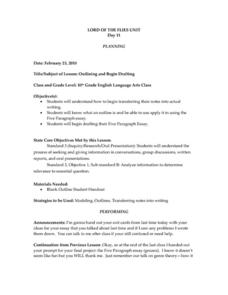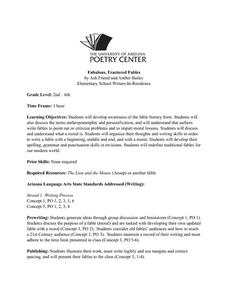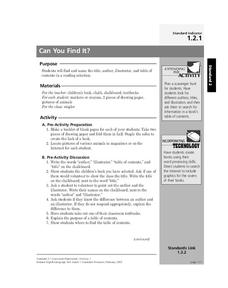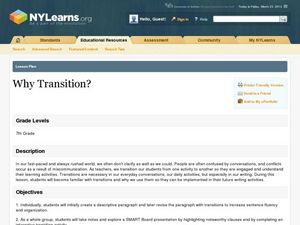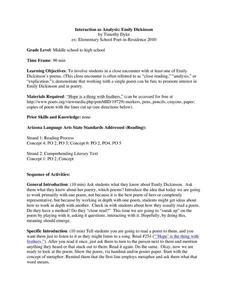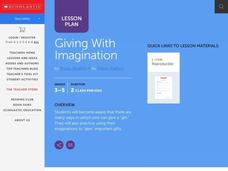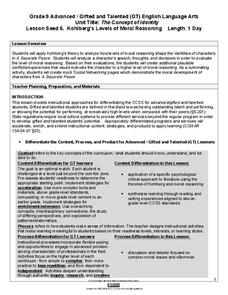Curated OER
Author, Author
First graders engage in this interesting lesson on letter writing and writing skills. In it, youngsters listen to the Jan Brett story, The Mitten, as a warm-up. They think of other animals of the world they could ask Jan Brett to...
Curated OER
Global Warming: Writing and Editing a Research Report
Bring environmental issues into your classroom! Practice writing and peer editing research reports on global warming and the greenhouse effect. Middle schoolers can work on their research skills, their writing skills, and how to...
Curated OER
Where in the United States Are We?
Fifth graders collaborate with another fifth grade classroom while learning about various locations in the United States. This is a telecollaborative video conferencing project that is designed for students studying United States history...
Curated OER
Making Objects Human
Explore poetry, personification, and multiple languages with a poetry reading and writing lesson. After the teacher reads the poem to the class, a discussion about personification follows. The class then writes a collaborative poem...
Novelinks
Lord of the Flies: Outlining and Begin Drafting
Help young writers with the daunting prospect of a five-paragraph essay. Using William Golding's Lord of the Flies, learners work through a short process to shore up their brainstorming and prepare to write a longer essay.
Curated OER
Fabulous, Fractured Fables
Elementary schoolers develop an awareness of the literary form known as the fable. They explore how authors write fables to pass along moral lessons. After reading and discussing many famous fables embedded in the plan, learners attempt...
Curated OER
Objectivity
Help young readers examine historic artifacts to determine if they were designed to help people survive or to create enjoyment. They identify objects that were designed to help people to survive and to enjoy themselves. Then compare and...
Curated OER
Eloquent Words
Logan’s Lament, a speech delivered by Mingo Chief Logan in 1774, provides pupils with an opportunity to not only study the historical events surrounding the battle between Native Americans and the Europeans for the West Virginia...
Curated OER
Can You Find It?
Plan a Parts of a Book scavenger hunt. Begin by giving your young adventurers a book, and asking them to find the title, author, illustrator, and table of contents. After a discussion of the purpose of each of these items, class members...
Curated OER
Note-Taking: K.I.S.S. "Keep It Short and Simple"
Note-taking is an essential study skill, and it needs to be taught! In the context of a research project on energy sources, learners find multiple sources, evaluating, paraphrasing, and citing them correctly. Two lists with note-taking...
Curated OER
Learning Life Lessons through Fables
Explore a variety of fables to learn life's lessons through engaging stories. Add rigor to the learning process with activities that include matching a a fable to the story's moral, short answer exit slips, and a three-column graphic...
Curated OER
Symphonic Poetry
Students interpret the themes in Tchaikovsky's Romeo and Juliet Fantasy Overture, create a 6-line poem based on the themes in the Romeo and Juliet Fantasy Overture, and define musical terms related to the study of programmatic music in...
Curated OER
Combining with Participial Phrases
Combine participial phrases and creative writing with this lesson, which is equally helpful for writing skills and conventions. After a mini-lesson on participial phrases and reading the picture book Dancing in the Wings, pupils use a...
Curated OER
Why Transition?
Help your class transition into better writers with this lesson, which guides them through the process of adding transitions to increase sentence fluency and organization. The activity is designed for a classroom with a SMART board, but...
Curated OER
Same Theme, Different Story Using Fox by Margaret Wild
Middle schoolers work with themes in this lesson, which is based on Fox by Margaret Wild. Because the book has multiple themes, it is a great way to transition into exploring literary analysis and writing stories. A Six Trait writing...
Curated OER
Interaction as Analysis: Emily Dickinson
Emily Dickinson’s “Hope is a thing with feathers” is the focus of a series of activities that model for learners how close reading can lead to understanding. The whole class plays with the metaphor, groups talk about the author’s...
Denver Art Museum
Descriptive Haiku
Even though this is technically an art lesson, haiku poetry is actually the main focus! Learners view photographs of Japanese tea caddies. They list five descriptive words for the caddies, then write haiku poems using the caddies as...
Curated OER
Letter Writing
Keep the art of letter writing alive in this age of Tweet and Twitter! The 10 activities detailed in this resource lead pupils through the process of crafting classic forms. A list of and links to famous letters is also included as part...
Curated OER
Birch Bark Biting
Fifth graders create birch bark biting art pieces. In this aboriginal art lesson, 5th graders produce art using birch bark. Students present their art pieces and explain their designs.
Curated OER
Giving with Imagination
Demonstrate gift giving as an act of caring about someone versus gifts for show (or gifts from the purse). Elementary learners practice giving gifts from the heart by creating a poem for someone special to them.
Scholastic
My Favorite Activity (Grades K-2)
Scholars discuss the many ways they use persuasion in their everyday lives and brainstorm specific ideas for encouraging someone to do something. With the list of persuasive techniques they made, young writers complete a graphic...
Curated OER
Writing Fables
Students write their own fables. In this writing fables lesson, students use handheld computers to write a fable. The class designs a spreadsheet to organize common elements of fables. Students also edit each others' work.
K12 Reader
United States Geography
Encourage reading for information with a text about United States geography. Kids read a short passage about the landforms in the United States, including mountain ranges and natural resources, and answer five reading comprehension...
Maryland Department of Education
The Concept of Identity Lesson 6: Kohlberg's Levels of Moral Reasoning
How does our moral reasoning shape our identity? After a study of Kohlberg's Levels of Moral Reasoning, readers use Kohlberg's theories to analyze the speech, thoughts, and decisions of a character in A Separate Peace. They then...






